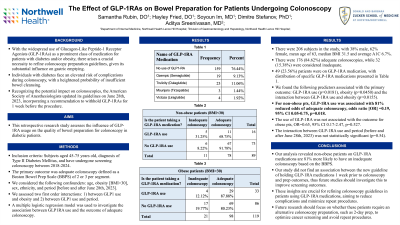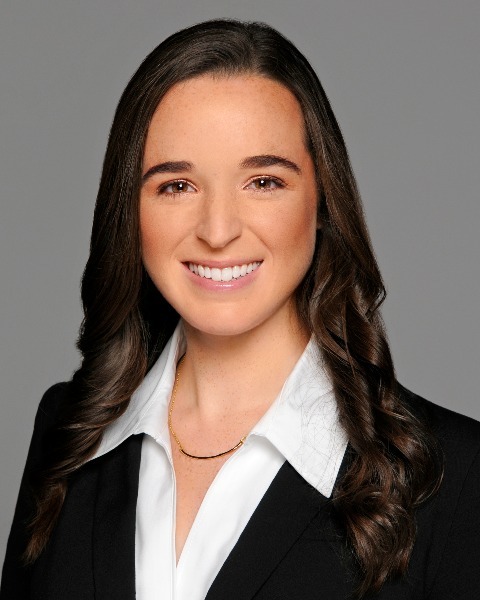Monday Poster Session
Category: Colon
P1944 - The Effect of Glucagon-Like Peptide-1 Receptor Agonists on Bowel Preparation for Patients Undergoing Colonoscopy
Monday, October 28, 2024
10:30 AM - 4:00 PM ET
Location: Exhibit Hall E

Has Audio

Samantha Rubin, DO
Lenox Hill Hospital, Northwell Health
New York, NY
Presenting Author(s)
Samantha Rubin, DO1, Hayley Fried, DO1, Soyoun Im, MD1, Dimitre Stefanov, PhD2, Aditya Sreenivasan, MD1
1Lenox Hill Hospital, Northwell Health, New York, NY; 2Northwell Health, New York, NY
Introduction: Glucagon-like peptide-1 receptor agonists (GLP-1s) are widely used for patients with diabetes and obesity. Patients with diabetes already face an elevated risk of inadequate colonoscopy preparation due to slow gastrointestinal motility. Given that GLP-1s cause an additional decrease in motility, further research is needed to understand how they may impact colonoscopy prep quality. This retrospective case-control study investigates the influence of GLP-1s on the colonoscopy prep of diabetic patients.
Methods: Patients who underwent screening colonoscopy at a medical center between 2018-2024 were retrospectively analyzed. Patients 45-75 years-old with Type II Diabetes Mellitus were included. Adequate colonoscopy was defined as Boston Bowel Preparation Scale of ≥ 2 in each segment of the colon. A multiple logistic regression model with a backward elimination was used to investigate the association between GLP1 use and adequate colonoscopy. The following confounders were considered: age, obesity (BMI ≥ 30), sex, ethnicity, and period (before and after the American Society of Anesthesiologists (ASA) updated guidelines to hold GLP-1s one week prior to colonoscopy). Two first-order interactions were assessed: between GLP1 use and obesity, and between GLP1 use and period. A two-sided p < 0.05 was considered statistically significant.
Results: A total of 208 patients were included, with 49 cases (patients on GLP1s) and 159 controls. There were 176 adequate colonoscopies. The following predictors were associated with the primary outcome of adequate colonoscopy: GLP1 use (p=0.018), obesity (p=0.045) and the interaction between GLP1 use and obesity (p=0.015).). The interaction between GLP1 use and period was not statistically significant (p=0.54). For non-obese patients, GLP1 use was associated with 81% reduced odds of adequate colonoscopy, odds ratio [OR] =0.19, 95% CI 0.05-0.75, p=0.018. The use of GLP1 was not associated with the outcome for obese patients (p=0.527). The percentage of adequate colonoscopy for each GLP1 group is presented in table 1.
Discussion: Our analysis revealed non-obese patients with diabetes on GLP-1 medications are 81% more likely to have an inadequate colonoscopy prep. This study did not find an association between the implementation of the new ASA guideline and prep outcome. With the growing rate of GLP-1s being prescribed in the U.S., it is essential to understand the effect of these medications on the quality of bowel preparation.
Note: The table for this abstract can be viewed in the ePoster Gallery section of the ACG 2024 ePoster Site or in The American Journal of Gastroenterology's abstract supplement issue, both of which will be available starting October 27, 2024.
Disclosures:
Samantha Rubin, DO1, Hayley Fried, DO1, Soyoun Im, MD1, Dimitre Stefanov, PhD2, Aditya Sreenivasan, MD1. P1944 - The Effect of Glucagon-Like Peptide-1 Receptor Agonists on Bowel Preparation for Patients Undergoing Colonoscopy, ACG 2024 Annual Scientific Meeting Abstracts. Philadelphia, PA: American College of Gastroenterology.
1Lenox Hill Hospital, Northwell Health, New York, NY; 2Northwell Health, New York, NY
Introduction: Glucagon-like peptide-1 receptor agonists (GLP-1s) are widely used for patients with diabetes and obesity. Patients with diabetes already face an elevated risk of inadequate colonoscopy preparation due to slow gastrointestinal motility. Given that GLP-1s cause an additional decrease in motility, further research is needed to understand how they may impact colonoscopy prep quality. This retrospective case-control study investigates the influence of GLP-1s on the colonoscopy prep of diabetic patients.
Methods: Patients who underwent screening colonoscopy at a medical center between 2018-2024 were retrospectively analyzed. Patients 45-75 years-old with Type II Diabetes Mellitus were included. Adequate colonoscopy was defined as Boston Bowel Preparation Scale of ≥ 2 in each segment of the colon. A multiple logistic regression model with a backward elimination was used to investigate the association between GLP1 use and adequate colonoscopy. The following confounders were considered: age, obesity (BMI ≥ 30), sex, ethnicity, and period (before and after the American Society of Anesthesiologists (ASA) updated guidelines to hold GLP-1s one week prior to colonoscopy). Two first-order interactions were assessed: between GLP1 use and obesity, and between GLP1 use and period. A two-sided p < 0.05 was considered statistically significant.
Results: A total of 208 patients were included, with 49 cases (patients on GLP1s) and 159 controls. There were 176 adequate colonoscopies. The following predictors were associated with the primary outcome of adequate colonoscopy: GLP1 use (p=0.018), obesity (p=0.045) and the interaction between GLP1 use and obesity (p=0.015).). The interaction between GLP1 use and period was not statistically significant (p=0.54). For non-obese patients, GLP1 use was associated with 81% reduced odds of adequate colonoscopy, odds ratio [OR] =0.19, 95% CI 0.05-0.75, p=0.018. The use of GLP1 was not associated with the outcome for obese patients (p=0.527). The percentage of adequate colonoscopy for each GLP1 group is presented in table 1.
Discussion: Our analysis revealed non-obese patients with diabetes on GLP-1 medications are 81% more likely to have an inadequate colonoscopy prep. This study did not find an association between the implementation of the new ASA guideline and prep outcome. With the growing rate of GLP-1s being prescribed in the U.S., it is essential to understand the effect of these medications on the quality of bowel preparation.
Note: The table for this abstract can be viewed in the ePoster Gallery section of the ACG 2024 ePoster Site or in The American Journal of Gastroenterology's abstract supplement issue, both of which will be available starting October 27, 2024.
Disclosures:
Samantha Rubin indicated no relevant financial relationships.
Hayley Fried indicated no relevant financial relationships.
Soyoun Im indicated no relevant financial relationships.
Dimitre Stefanov indicated no relevant financial relationships.
Aditya Sreenivasan indicated no relevant financial relationships.
Samantha Rubin, DO1, Hayley Fried, DO1, Soyoun Im, MD1, Dimitre Stefanov, PhD2, Aditya Sreenivasan, MD1. P1944 - The Effect of Glucagon-Like Peptide-1 Receptor Agonists on Bowel Preparation for Patients Undergoing Colonoscopy, ACG 2024 Annual Scientific Meeting Abstracts. Philadelphia, PA: American College of Gastroenterology.

